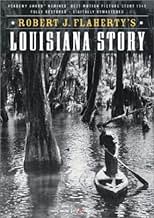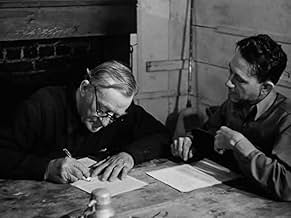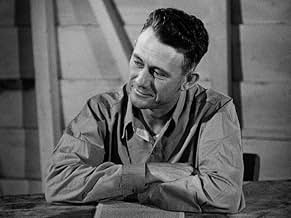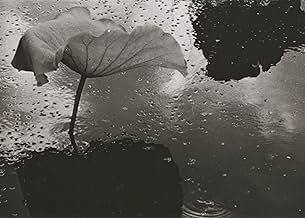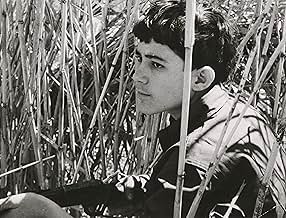Louisiana Story
- 1948
- Tous publics
- 1h 18min
NOTE IMDb
6,4/10
2,3 k
MA NOTE
Ajouter une intrigue dans votre langueThe idyllic life of a young Cajun boy and his pet raccoon is disrupted when the tranquility of the bayou is broken by an oil well drilling near his home.The idyllic life of a young Cajun boy and his pet raccoon is disrupted when the tranquility of the bayou is broken by an oil well drilling near his home.The idyllic life of a young Cajun boy and his pet raccoon is disrupted when the tranquility of the bayou is broken by an oil well drilling near his home.
- Réalisation
- Scénario
- Casting principal
- Nommé pour 1 Oscar
- 4 victoires et 3 nominations au total
Avis à la une
Joseph Boudreaux is a Cajun boy living in the bayous. When a wildcat rig starts to drill near his home, he makes friends with the crew.
It's directed by pioneer documentarian Robert J. Flaherty. Flaherty for decades was considered the model documentarian. This was in large part because his NANOOK OF THE NORTH was wildly successful. Nowadays, the admiration has died down.He imposed story lines on his movies, and directed scenes to support them, as opposed to the modern ideal of shooting a tremendous amount of footage of things happening, and then editing the results to bring some sort of coherence to the resulting film. You can see his story-telling technique in the sequence where Boudreaux captures an alligator. In addition, the presence of the drillers is portrayed as completely benign, with no impact on the local wildlife. Modern understanding of global warming and the impact of oil spills and the Deepwater Horizon disaster makes this seem naive. However, Standard Oil underwrote this movie, just as NANOOK had been underwritten by furriers.
The resulting movie is a warm and idyllic one, with amusing details of Cajun superstition and the beauty of the local setting. Although not as informative as modern documentaries try to be, it's beautifully shot and well put together. Virgil Thomson won the Pulitzer Prize for best composition, the only time a movie score has achieved that distinction.
It's directed by pioneer documentarian Robert J. Flaherty. Flaherty for decades was considered the model documentarian. This was in large part because his NANOOK OF THE NORTH was wildly successful. Nowadays, the admiration has died down.He imposed story lines on his movies, and directed scenes to support them, as opposed to the modern ideal of shooting a tremendous amount of footage of things happening, and then editing the results to bring some sort of coherence to the resulting film. You can see his story-telling technique in the sequence where Boudreaux captures an alligator. In addition, the presence of the drillers is portrayed as completely benign, with no impact on the local wildlife. Modern understanding of global warming and the impact of oil spills and the Deepwater Horizon disaster makes this seem naive. However, Standard Oil underwrote this movie, just as NANOOK had been underwritten by furriers.
The resulting movie is a warm and idyllic one, with amusing details of Cajun superstition and the beauty of the local setting. Although not as informative as modern documentaries try to be, it's beautifully shot and well put together. Virgil Thomson won the Pulitzer Prize for best composition, the only time a movie score has achieved that distinction.
Let's face it, there really isn't much to this movie. It's a movie directed by Robert J. Flaherty, who was best known for his documentaries and his most famous and first movie "Nanook of the North", which wasn't even a real documentary. This movie also ain't no documentary and its something that is somewhat between a full length movie and a fake-documentary, like "Nanook of the North".
In all honesty because of its style and approach, the whole movie and its story was far from an interesting one. It's not really a movie in which a lot is happening and there is no drama to the story in terms of having something awful or shocking happen in it. It just tells the story of a little Cajun boy who enjoys living in the swampy Louisiana area, when suddenly an oil company shows up and starts building an oil derrick. You think that after this point his whole life will change and he'll do anything to prevent the oil company from drilling and destroying the territory he loves to play and hunt in. This movie however got actually produced by an oil company, so there is no such happening in this movie at all. Instead he makes friends with the oil people and just go on about his life as if nothing has drastically changed. This is why "Louisiana Story" just isn't that interesting or strong as movie, story-wise.
It's however still a very well directed one. Every shot got set up nicely and Robert J. Flaherty obviously had an eye for the environments and for creating some beautiful set up shots. The movie is also supported by a really nice musical score by Virgil Thomson. The editing at times is however really off and at times ruins some of the movie its pacing.
Not really a that interesting movie to watch but still perfectly watchable because of how fine it's all made.
7/10
http://bobafett1138.blogspot.com/
In all honesty because of its style and approach, the whole movie and its story was far from an interesting one. It's not really a movie in which a lot is happening and there is no drama to the story in terms of having something awful or shocking happen in it. It just tells the story of a little Cajun boy who enjoys living in the swampy Louisiana area, when suddenly an oil company shows up and starts building an oil derrick. You think that after this point his whole life will change and he'll do anything to prevent the oil company from drilling and destroying the territory he loves to play and hunt in. This movie however got actually produced by an oil company, so there is no such happening in this movie at all. Instead he makes friends with the oil people and just go on about his life as if nothing has drastically changed. This is why "Louisiana Story" just isn't that interesting or strong as movie, story-wise.
It's however still a very well directed one. Every shot got set up nicely and Robert J. Flaherty obviously had an eye for the environments and for creating some beautiful set up shots. The movie is also supported by a really nice musical score by Virgil Thomson. The editing at times is however really off and at times ruins some of the movie its pacing.
Not really a that interesting movie to watch but still perfectly watchable because of how fine it's all made.
7/10
http://bobafett1138.blogspot.com/
Having lived many years in Acadiana, I can tell you that this is a beautiful depiction of the immense grace of the area during the forties. The film is not great drama, but the mystery and immense beauty of the bayou is authentic. Joseph Boudreaux, the boy in the movie will melt your heart with his lovely presence and Cajun ways.
Thankfully, this film was placed in the archives of the National Library of Congress in the nineties. The restoration is exquisite! I, for one, am thankful that this monumental tribute to the true Cajun people, as they once were, has been resurrected.
Much of what you will see in this film is, sadly, gone forever. There will never be another tribute to Acadiana like Louisiana Story!
Thankfully, this film was placed in the archives of the National Library of Congress in the nineties. The restoration is exquisite! I, for one, am thankful that this monumental tribute to the true Cajun people, as they once were, has been resurrected.
Much of what you will see in this film is, sadly, gone forever. There will never be another tribute to Acadiana like Louisiana Story!
The opening scenes paint an idyllic picture of nature as well as the relationship it shares with people. With vegetation reflected off the surfaces of ponds, animals roaming about, and the sounds of nature in the background, the bayou feels like a slice of heaven. Even the people who occupy this land don't disrupt the environment since they appear to be one with nature. This is until we're introduced to the threat of industrialization. It starts with the boy (he's referred to as Alexander in the opening, but he's credited as "The Boy" in the film) being knocked into the water due to the wake of a motorboat. We then see an oil tower poking through some trees in the background. The interference of industrialization keeps spiraling until we're introduced to an oil well. With smog being released from its exhaust pipes and the sounds of its machinery being audible throughout much of the bayou, it seems out of place and sacrilegious.
The more one watches the film though, it becomes readily apparent that we're watching a glorification of the oil industry since the film refuses to properly acknowledge the problems it causes to the bayou. You're clearly asked to support the oil well, but given the glaring issues it causes (in addition to the real-world negative effects oil drilling has on the environment), this puts the film at odds with itself. Coming mainly from the perspectives of the working man and those impacted by the oil well, the potential for a great critique on industrialization is there, but we're instead left with an incongruity between the depiction and the endorsement of the industry. Flaherty was commissioned by Standard Oil to make the film though, so it's no surprise that it's propaganda.
The best parts of the film concern the boy's trials within the bayou. As idyllically shot as the bayou is, we're constantly reminded of the danger some of the wildlife poses, specifically in regards to an alligator which recurs throughout the film. Its scenes are memorable, with the standout being a middle scene where the boy attempts to catch it. That scene is tense, but Flaherty was undoubtedly a madman when shooting it. Boudreaux's and the alligator's scenes weren't recorded separately or anything. Rather, they were in fairly close proximity to each other, thus putting Boudreaux in actual danger when that scene was shot. As a result, the suspense in that sequence concerns worrying about real-life harm coming to the actor. To be clear, I don't approve of this as it's clearly child endangerment, but on a gut level, it made for a certain kind of thrill which left a visceral impact on me.
Overall, it's fairly interesting and I enjoyed it in some respects, but the propagandistic elements made it feel like a missed opportunity.
The more one watches the film though, it becomes readily apparent that we're watching a glorification of the oil industry since the film refuses to properly acknowledge the problems it causes to the bayou. You're clearly asked to support the oil well, but given the glaring issues it causes (in addition to the real-world negative effects oil drilling has on the environment), this puts the film at odds with itself. Coming mainly from the perspectives of the working man and those impacted by the oil well, the potential for a great critique on industrialization is there, but we're instead left with an incongruity between the depiction and the endorsement of the industry. Flaherty was commissioned by Standard Oil to make the film though, so it's no surprise that it's propaganda.
The best parts of the film concern the boy's trials within the bayou. As idyllically shot as the bayou is, we're constantly reminded of the danger some of the wildlife poses, specifically in regards to an alligator which recurs throughout the film. Its scenes are memorable, with the standout being a middle scene where the boy attempts to catch it. That scene is tense, but Flaherty was undoubtedly a madman when shooting it. Boudreaux's and the alligator's scenes weren't recorded separately or anything. Rather, they were in fairly close proximity to each other, thus putting Boudreaux in actual danger when that scene was shot. As a result, the suspense in that sequence concerns worrying about real-life harm coming to the actor. To be clear, I don't approve of this as it's clearly child endangerment, but on a gut level, it made for a certain kind of thrill which left a visceral impact on me.
Overall, it's fairly interesting and I enjoyed it in some respects, but the propagandistic elements made it feel like a missed opportunity.
This is a classic film that blurs the line between documentary and fiction. Here, you won't find a very good plot, but some very interesting sequences and some of the most visually pleasing imagery ever put to screen.
From watching both this and "Man of Aran" you can tell that Flaherty is a very unconventional filmmaker. His films have staged scenes that, as I mentioned earlier, blur the line between fiction and nonfiction creating a nontraditional signature style.
In this film, we follow a young boy (and his friend, a raccoon) living an average life in his hometown. We see him paddle down rivers, walk through the woods, and have tons of entertaining adventures. Then, a bunch of oil drillers move to town. We watch these oil drillers do their work with very minimal dialogue. It's almost all expressed in visuals.
While the film may sound boring and seems to start off kind of boring, in the end, it's a truly adventurous masterpiece! One of my favorites!
From watching both this and "Man of Aran" you can tell that Flaherty is a very unconventional filmmaker. His films have staged scenes that, as I mentioned earlier, blur the line between fiction and nonfiction creating a nontraditional signature style.
In this film, we follow a young boy (and his friend, a raccoon) living an average life in his hometown. We see him paddle down rivers, walk through the woods, and have tons of entertaining adventures. Then, a bunch of oil drillers move to town. We watch these oil drillers do their work with very minimal dialogue. It's almost all expressed in visuals.
While the film may sound boring and seems to start off kind of boring, in the end, it's a truly adventurous masterpiece! One of my favorites!
Le saviez-vous
- AnecdotesStandard Oil of New Jersey (became Exxon in 1972 and Exxon/Mobil in 1999) contributed $258,000 to the film's production. Although the company had no rights and no identification in the film, it stood "to get across the idea that oil companies are beneficently public-spirited, their employees honest, industrious and amiable, and their operations productive and innocuous." According to a modern source, Robert J. Flaherty's contract with Standard Oil insured that all of the film's profits went to him. The only connection was that Humble Derrick No. 1 is mentioned - and the Humble Oil Co. was 50% owned by Standard Oil of New Jersey at the time.
- GaffesIn the opening sequence, when The Boy first spots the raccoon, his hair is neat. Then it's mussed. Then it's neat again.
- ConnexionsFeatured in Studies for Louisiana Story (1965)
Meilleurs choix
Connectez-vous pour évaluer et suivre la liste de favoris afin de recevoir des recommandations personnalisées
- How long is Louisiana Story?Alimenté par Alexa
Détails
Box-office
- Budget
- 258 000 $US (estimé)
- Durée
- 1h 18min(78 min)
- Couleur
- Rapport de forme
- 1.37 : 1
Contribuer à cette page
Suggérer une modification ou ajouter du contenu manquant

